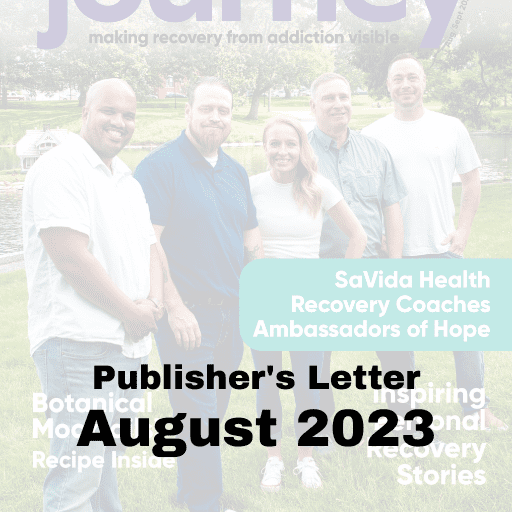In this issue of Journey, we explore, celebrate and expand on communities.
We shine a light on inclusivity, alcohol-free by design experiences, and creating or joining communities that nurture understanding, acceptance, and diversity. It’s a place where ideas bloom, and dreams can find roots.
I love the idea that as we recover, we evolve—not just as individuals but as a part of a community brought together to support and encourage each other because the people we surround ourselves with can become our architects and pillars of hope.
One of our articles represents a supportive community memory for me and I’m thrilled to share here about their mission.
One snowy night in 1985, my roommates had called the police on me for using and dealing drugs from the apartment. My roommates had packed my things and didn’t want me there anymore. The police couldn’t arrest me, but they also didn’t want to leave me on the sidewalk with my things. So they brought me to a brand new shelter on Brackett Street in Portland. Elizabeth and Claude Montgomery opened the Friendship House as a place for people like me— homeless—so I was a guest and one of the first five or so to stay.
What I remember was the amazing food, the kindness and compassion I was treated with by people who didn’t even know me, and the many people that came with clothing, toiletries, etc. for those of us staying there. Today, the Friendship House still provides a safe avenue to sobriety and a full life, but now it supports men. Please read all about them on page 42.
Thankfully, I’ve been a part of many types of communities, or groups of people, since I got sober and even now, all of which help to shape the woman I’m becoming. When I step into new spaces, it’s usually for a reason—to enrich my spiritual growth, to learn new skills, to deepen my relationships, to spend time with people who enjoy what I enjoy.
In this issue, we explore the expanding inclusivity for people who don’t drink or do drugs. From sober cafes to concerts to sporting events, these venues aren’t just physical spaces creating an opportunity for inclusivity, they are social statements that challenge the societal norm of alcohol being integral to celebration and socialization.
This is how we change the narrative—by expanding the lens by which people view addiction and recovery.
Be sure to check out Beth D’Ovidio’s article, Maine Treatment and Recovery Runs on Dunkin’ about Journey’s community Pop-Up Resource Events. We are quite literally meeting people where they’re at—thanks to great partnerships!
Since our very first team meeting on November 8, 2018, we’ve held true to our core values as a team of people fiercely devoted to making recovery visible and celebrating freedom from addiction. Thankfully we lean on these values when making decisions about what and who to include our magazine and reserve the right to refuse advertisers and editorial content that doesn’t align with these values.



